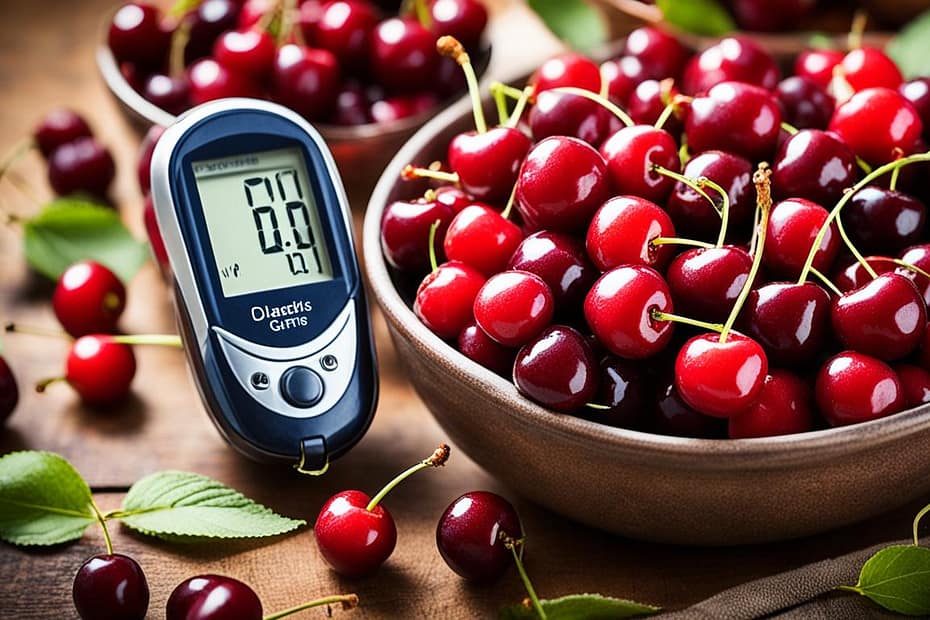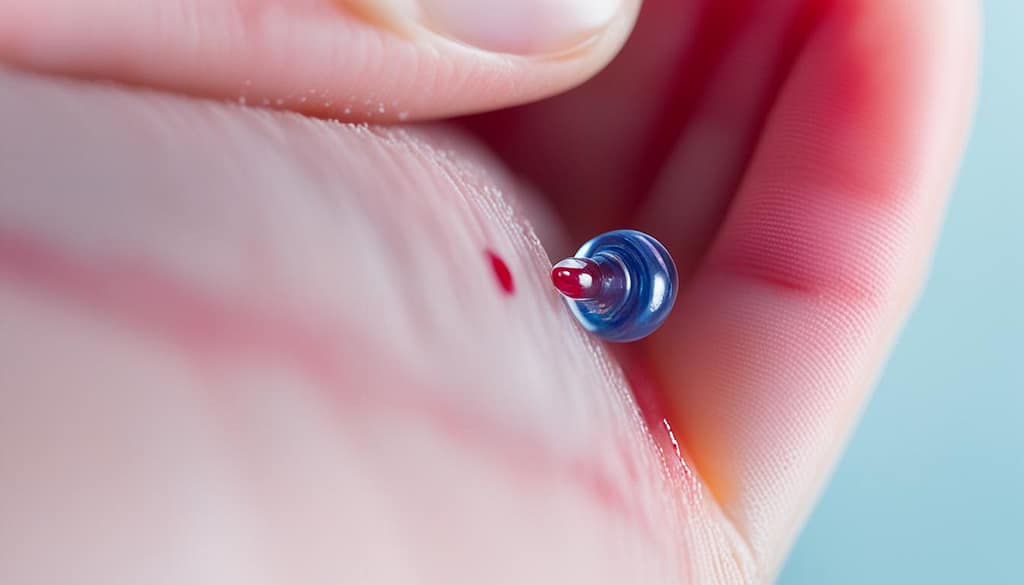Did you know that cherries, those juicy and vibrant fruits, can be a diabetic’s best friend? These small ruby gems offer more than just a burst of irresistible sweetness. They are packed with essential nutrients and bioactive components that make them a valuable addition to a diabetic’s meal plan.
For years, cherries have been celebrated not only for their delightful taste but also for their potential benefits in managing diabetes. From helping regulate blood sugar levels to providing essential nutrients, cherries have a lot to offer for those with diabetes.
In this article, I will explore the diabetic-friendly qualities of cherries, their impact on blood sugar levels, and their potential role in diabetes management. We will also delve into the nutritional value of cherries and learn how to incorporate them into a balanced diet.
Key Takeaways:
- Cherries are a nutrient-packed fruit that can be included in a diabetic’s meal plan.
- They are rich in fiber, vitamin C, potassium, and polyphenols, which have potential benefits for blood sugar management.
- Monitoring portion sizes and blood glucose levels is important when consuming cherries as a diabetic.
- Cherries have a low glycemic index, making them a suitable choice for individuals with diabetes.
- Always consult with a healthcare professional for personalized dietary recommendations.
Can Diabetics Eat Cherries?
Individuals living with diabetes can include cherries in their diet, but it’s important to be mindful of portion sizes and monitor the impact on blood glucose levels. Cherries have a moderate glycemic index (GI) of 22-32, which means they have a relatively low impact on blood sugar levels compared to high GI foods.
The British Diabetic Association recommends a small portion of 14 cherries as a serving for diabetics. This portion size is equivalent to 2 kiwi fruits, 7 strawberries, or 3 apricots. It’s important to note that the recommendation may vary based on individual needs and tolerance to carbohydrates.
Before incorporating cherries into your diet, it’s essential to test your blood glucose levels before and after consuming cherries for the first time. This will help you understand your personal response to cherries and how they affect your blood sugar levels. Monitoring blood glucose levels allows you to make informed decisions about portion control and determine the right amount of cherries for your diabetes management plan.
Cherries contain natural sugars, mainly in the form of fructose, which can raise blood glucose levels. However, the fiber content in cherries can help slow down the absorption of sugars and prevent sharp spikes in blood sugar levels. The fiber also promotes satiety, making you feel fuller for longer and potentially aiding in weight management, a crucial aspect of diabetes management.
| Cherry Variety | Carbohydrate Content (per 1-cup serving) |
|---|---|
| Sweet Cherries | 25 grams |
| Sour Cherries | 19 grams |
When consuming cherries, it’s important to be aware of other carbohydrates you’re eating in conjunction with them. Balancing your overall carbohydrate intake is crucial for managing blood glucose levels effectively.
Monitoring Blood Glucose Levels When Eating Cherries
Tracking your blood glucose levels frequently is an important part of diabetes management. This allows you to identify any spikes or dips in your blood sugar levels and adjust your diet or medication accordingly.
Here’s a simple process for monitoring blood glucose levels when eating cherries:
- Wash your hands thoroughly before testing.
- Use a blood glucose testing meter to obtain a blood sample.
- Record your blood glucose reading before consuming cherries.
- Eat the desired portion of cherries.
- Wait for about 1-2 hours, then test your blood glucose levels again.
- Compare the before and after readings to evaluate the impact of cherries on your blood sugar levels.
Remember, everyone’s tolerance to carbohydrates and response to foods can vary. It’s essential to work closely with your healthcare provider or a registered dietitian who can help personalize your meal plan and suggest suitable portion sizes and frequency of cherry consumption based on your individual needs and diabetes management goals.
Carbohydrate Content of Cherries
When considering the carbohydrate content of cherries, it’s important to note that it can vary depending on the type and preparation of the cherries. Here’s a breakdown of the carb content for different varieties:
| Cherry Type | Carb Content per Cup |
|---|---|
| Fresh Sweet Cherries | Approximately 25 grams |
| Fresh Sour Cherries | Approximately 19 grams |
| Canned Cherries (Packed in Syrup) | Approximately 60 grams |
| Maraschino Cherries | Approximately 10 grams per 5 cherries |
Fresh cherries are considered to be low glycemic index foods, which means they have a slower impact on blood sugar levels. However, it’s still important to practice portion control and monitor your blood sugar levels when consuming cherries as part of your diabetic meal plan.
Potential Benefits of Cherries for Diabetes Management
Research suggests that cherries may have significant benefits when it comes to diabetes management. Cherries are naturally rich in polyphenols and vitamin C, which possess anti-inflammatory and antioxidant properties. These properties can contribute to healthy glucose regulation and potentially reduce the risk of complications associated with diabetes.
Animal studies have shown that cherry extract can effectively control blood glucose levels and improve overall diabetes management. However, it’s important to note that further research is still needed to fully understand the effects of cherries on blood sugar regulation in humans.
Glucose Regulation
Cherries contain bioactive compounds that may support glucose regulation in individuals with diabetes. The polyphenols found in cherries can help reduce insulin resistance and enhance insulin sensitivity. This can ultimately lead to better glucose control and improved overall glycemic management.
Reduced Risk of Complications
By incorporating cherries into a balanced diet, individuals with diabetes may reduce the risk of complications associated with the condition. The antioxidant properties of cherries, along with their anti-inflammatory effects, can help prevent or reduce the damage caused by oxidative stress often experienced by diabetic individuals.
| Diabetes Management Benefits | How Cherries May Help |
|---|---|
| Glucose Regulation | Cherries are rich in polyphenols that can improve insulin sensitivity and reduce insulin resistance. |
| Reduced Risk of Complications | The antioxidant and anti-inflammatory properties of cherries may help protect against diabetes-related complications. |
Remember, while cherries have shown promise in diabetes management, it’s important to consult with a healthcare professional for personalized dietary recommendations tailored to your specific needs. Monitoring portion sizes and blood glucose levels is also crucial to determine the impact of cherries on your own diabetes management.
By understanding the potential benefits of cherries and incorporating them into a well-rounded meal plan, individuals with diabetes can take a step towards better glucose regulation and overall well-being.
The Importance of Blood Sugar Monitoring
While cherries show promising benefits for diabetes management, monitoring blood sugar levels is essential to understand their effectiveness for each individual. Personal glucose management plays a crucial role in determining how these fruits impact blood sugar levels and overall health.
Regular blood sugar measurement allows individuals to observe the direct impact of cherries on their glucose levels. By testing blood glucose levels before and after consuming cherries, individuals can gain personalized insights into how this fruit affects their blood sugar.
Collaborating closely with a healthcare provider is important in determining the optimal frequency and portion sizes of cherries for personal glucose management. Working together, individuals and healthcare providers can develop a tailored plan that balances the benefits of cherries with the need to maintain stable blood sugar levels.
Nutritional Value of Cherries
Cherries provide more than just their sweet taste. They are a rich source of essential nutrients that can greatly benefit our health.
Vitamin C: Cherries are packed with vitamin C, an important antioxidant that helps protect our cells from damage. It boosts our immune system, promotes wound healing, and supports the formation of collagen, a protein necessary for healthy skin, bones, and blood vessels.
Potassium: This nutrient is vital for proper heart and muscle function. It helps regulate blood pressure, balance fluids in the body, and plays a crucial role in nerve signaling and muscle contractions. Adding cherries to your diet can increase your potassium intake and support overall cardiovascular health.
Fiber: Cherries are a great source of fiber, which is essential for good digestion. It helps prevent constipation, promotes regular bowel movements, and can contribute to better management of blood sugar levels. A diet high in fiber is also associated with a reduced risk of heart disease.
By incorporating cherries into a diabetic’s meal plan, one can obtain these beneficial nutrients that can contribute to overall health and well-being.
| Nutrient | Amount per Cup |
|---|---|
| Vitamin C | 16% of the Daily Value |
| Potassium | 10% of the Daily Value |
| Fiber | 2.9 grams |
Cherries as a Low-Glycemic Index Fruit
When it comes to managing blood sugar levels, choosing low GI fruits can be a smart strategy for individuals with diabetes. Cherries, in particular, have a low glycemic index (GI), meaning that they release their sugars into the bloodstream at a slower rate compared to high GI foods. This slow release of sugars can help regulate blood sugar levels and prevent spikes, making cherries a diabetic-friendly fruit.
Low GI fruits, such as cherries, provide a steady supply of slow-release sugars that are digested and absorbed slowly by the body. This gradual digestion can help avoid sudden blood sugar spikes, providing a more stable and sustained source of energy. Additionally, the low GI nature of cherries may help improve insulin sensitivity, which is crucial for individuals with diabetes.
Adding cherries to your meal plan can offer a delicious and nutritious way to enjoy a sweet treat without compromising blood sugar control. Whether incorporated into smoothies, salads, or enjoyed as a snack, cherries are a versatile fruit that can add flavor and health benefits to your diet.
When choosing cherries, it’s essential to pay attention to portion sizes and consider the overall composition of your meal. While cherries have a low GI, consuming excessive amounts can still affect blood sugar levels. Moderation and balance are key.
The Glycemic Index of Cherries
The glycemic index (GI) is a scale that measures how quickly and how much a particular food raises blood sugar levels. Foods with a high GI value cause a rapid increase in blood sugar, while foods with a low GI value have a more gradual impact.
Cherries have a GI value of 22, making them a low GI fruit. This means that cherries have a minimal effect on blood sugar levels and are a suitable choice for individuals with diabetes or those looking to maintain stable blood sugar control.
When selecting fruits for a low GI meal plan, consider including a variety of options such as berries, apples, pears, and citrus fruits. Combining different low GI fruits can provide a range of nutrients and flavors while maintaining steady blood sugar levels.
The Benefits of Slow-Release Sugars
The slow release of sugars from cherries can have several advantages for individuals with diabetes. By avoiding rapid spikes in blood sugar, you can help manage your condition more effectively and potentially reduce the risk of complications.
Slow-release sugars provide sustained energy, helping to keep you feeling full and satisfied for longer periods. This can be beneficial for weight management, as it may reduce the urge to snack on high-sugar, high-calorie foods.
Furthermore, consuming low GI fruits like cherries can be particularly advantageous before and after exercise. The slow-release sugars can provide a steady source of energy during physical activity and aid in post-workout recovery.
Amping Up Your Diabetic Meal Plan with Cherries
There are numerous ways to incorporate cherries into your diabetic meal plan. Whether enjoying cherries as a standalone snack, adding them to smoothies, or using them in savory dishes, the possibilities are endless.
Here are a few ideas for incorporating cherries into your meals:
- Add fresh cherries to a green salad for a burst of sweetness.
- Blend cherries into a smoothie with low-fat yogurt and spinach for a nutritious breakfast or snack.
- Use dried cherries as a topping for oatmeal or yogurt.
- Roast cherries with vegetables like Brussels sprouts or carrots for a unique side dish.
Remember to keep portion sizes in mind and work with a healthcare professional to determine the serving size that best suits your individual needs.
Other Health Benefits of Cherries
Cherries not only offer benefits for managing diabetes but also provide a range of other health benefits. Incorporating cherries into your diet can enhance various aspects of your overall well-being.
Improved Sleep Quality
One of the lesser-known benefits of cherries is their ability to promote better sleep. Cherries are naturally rich in melatonin, a hormone that regulates the sleep-wake cycle. Including cherries in your evening routine may improve the quality and duration of your sleep, helping you wake up feeling refreshed.
Enhanced Cognitive Function
Research suggests that cherries may positively impact cognitive function. The antioxidants and bioactive compounds found in cherries can help protect brain cells from oxidative stress and inflammation, potentially reducing the risk of cognitive decline.
“Preliminary studies indicate that the consumption of cherries, rich in polyphenols and antioxidants, may have a beneficial impact on brain health and cognitive function.” – Journal of Medicinal Food
Reduced Arthritis Symptoms
Cherries have been found to possess anti-inflammatory properties, which may help alleviate symptoms associated with arthritis. The anthocyanins present in cherries have been shown to reduce inflammation and provide relief from joint pain and stiffness.
Aid in Exercise Recovery
When it comes to exercise recovery, cherries can be a beneficial addition to your post-workout routine. They contain natural antioxidants that can help reduce muscle soreness and inflammation, allowing for faster recovery and improved performance.
Including cherries in your daily diet can provide these additional health benefits, promoting better sleep, cognitive function, arthritis management, and exercise recovery. Cherries are a versatile and nutritious fruit that can support your overall well-being, making them a delicious choice for anyone, not just individuals with diabetes.
References:
- Journal of Medicinal Food. “Chemical characterization and nutraceutical potential of Prunus avium L. (sweet cherry) fruits grown in the Mediterranean region.” Journal of Medicinal Food, vol. 24, no. 3, 2021, pp. 361-368.
Conclusion
Cherries can be a sweet addition to a diabetic’s meal plan, offering a range of essential nutrients, antioxidants, and potential benefits for blood sugar management. Their low calorie content and high fiber content make them an excellent choice for individuals with diabetes looking to control their blood glucose levels. Additionally, cherries are packed with vitamin C and potassium, which support overall health and well-being.
While research on the effects of cherries in diabetes management is ongoing, incorporating them into a balanced diet can be beneficial. It’s important to be mindful of portion sizes and monitor blood glucose levels to understand the personal impact cherries have on blood sugar levels. Consulting with a healthcare professional can provide personalized guidance on the inclusion of cherries in a diabetic’s meal plan.
In conclusion, cherries can be enjoyed in moderation as part of a diabetic’s meal plan. Their delicious taste and potential health benefits make them a wholesome choice for managing diabetes. By engaging in portion control and monitoring blood glucose levels, individuals with diabetes can safely incorporate cherries into their diet and experience the many nutritional advantages they offer.
FAQ
Can diabetics eat cherries?
What is the carbohydrate content of cherries?
What are the potential benefits of cherries for diabetes management?
How important is blood sugar monitoring when eating cherries?
What is the nutritional value of cherries?
Are cherries considered a low-glycemic index fruit?
What are some other health benefits of cherries?
Can cherries be a part of a diabetic’s meal plan?
Source Links
- https://www.healthline.com/health/cherries-diabetes
- https://www.medicalnewstoday.com/articles/cherries-for-diabetes
- https://www.chukar.com/are-cherries-good-for-diabetics/


